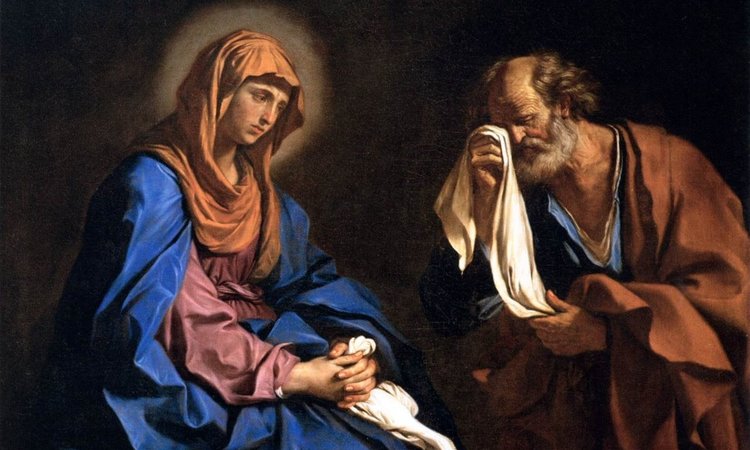* * * * * * *
No One Said Much – A Holy Saturday Reflection
By Gerald Hiestand, March 31, 2018
(Center for Pastoral Theology Blog)
Looking out the window, I see the dark outline of the temple slowly emerge against the pale light of the eastern sky. Some of the women are stirring, and I suppose they are leaving for the tomb. The remaining torch casts a flickering shadow against the far wall, and the noises of soft groaning and steady rocking are the only sounds that disturb the dark silence. I have not slept this night, nor have most of the others. The ones fortunate enough to sleep have found only a temporary peace—a fitful respite—and I do not envy their waking moments. No one says much, not even Peter. He has not been with us much this Sabbath. By the looks of him, I do not think he has slept at all. There is a deep, unquenchable sorrow in his face, and I fear that he blames himself for what has happened. Perhaps he thinks that we do as well.
But I have no energy for judgment. I have no energy for anything. It is not the pain, so much, that smothers me. It is the hopelessness. One can survive pain when one has hope, but without hope one has nothing. Hope is a dangerous thing, for the more you trust in it, the more destroyed you are when it fails you. And my hope has failed me. I am crushed, ruined. There is nothing left. The pain is so deep it has left me hollow, the disappointment so numbing I cannot feel. Even my anger at God cannot sustain me.
My wounded thoughts turn toward Heaven and questions that I have been too weary to ask drift silently from my lips. Does not the psalmist say, Lord God, that you deliver your righteous ones from all their enemies? Yet were not his final words, “My God My God why have you forsaken me?†How thoroughly you have deceived us. We had been so sure that he was the one you had sent to redeem Israel. Had not even he thought it so? You gave him power to deliver from death, yet you would not deliver him—you who shook the earth when he died and blackened the sun as he gave up his spirit. Eloi Eloi Lameth Sabactheni. You have forsaken one who did not forsake you. My spirit is crushed within me. My hope has fallen to the ground.
And then it comes, like a breath, like a whisper; as gentle as a thought. In what have you hoped, child? I pause. I answer the whisper, my heart heavy with bitterness. “I have hoped in you.â€
Brushing aside my answer, the whisper asks again, In what have you hoped, child? “Sorrow upon sorrow,†I respond, “I have hoped in you.â€
Again the question comes, soft, relentless, In what have you hoped, child? And now the pain in my heart is awakened the anger of betrayal, the sickening feeling of misplaced trust. With a bitter heart, I offer my lament. “I had hoped in you.â€
There is a long silence. At last, the voice speaks—softer than before, but heavier, a statement, so sure, so true that it cannot be questioned, No my child. You have hoped in your own understanding.
I hear the sound of footsteps on the stairs. The door crashes open and morning sunlight floods into the room. It is Mary. A heavenly light dances in her eyes and her smile shines like that of an angel.
––––––––––
“As the heavens are higher than the earth, so are my ways higher than your ways and my thoughts than your thoughts..†Isaiah 55:9

Dr. Gerald Hiestand is the co-founder and Executive Director of the Center For Pastor Theologians. Gerald also serves as the Senior Associate Pastor of Calvary Memorial Church in Chicagoland. He holds undergraduate and graduate degrees in theology and completed his PhD in Classics from the University of Reading.
 This year I have been feeling disconnected from Easter. Maybe part of it has to do with traveling all month and not being part of Holy Week with our Church Community this year. I think it’s also because it feels like I have lost the spiritual rhythms that used to be so natural for me. That has to do with a lot of changes over these past years and learning what new rhythms emerge at this stage of my life. This year, the work of others through the gift of poetry and storytelling have captured my heart and emotions in a fresh way.
This year I have been feeling disconnected from Easter. Maybe part of it has to do with traveling all month and not being part of Holy Week with our Church Community this year. I think it’s also because it feels like I have lost the spiritual rhythms that used to be so natural for me. That has to do with a lot of changes over these past years and learning what new rhythms emerge at this stage of my life. This year, the work of others through the gift of poetry and storytelling have captured my heart and emotions in a fresh way.